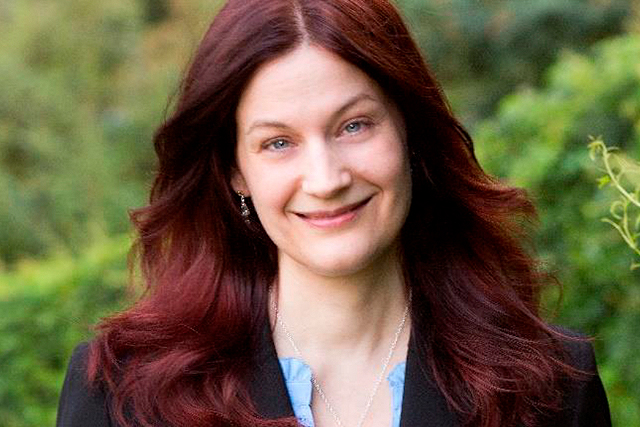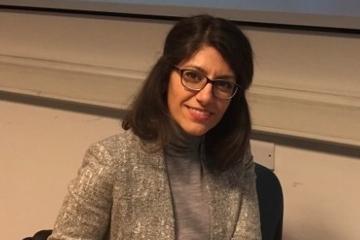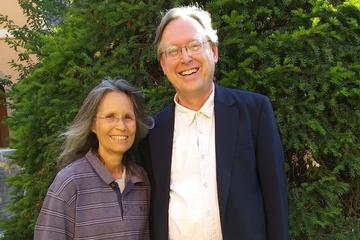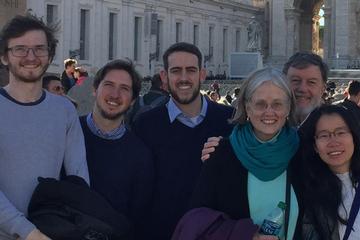
By Laura Ieraci
ROME — Ecumenist and Lonergan scholar Karen Petersen Finch said she anticipates her six-month sabbatical in Rome will contribute to her teaching come fall, allowing her to offer students an even “wider perspective” in their study of theology.
The 51-year-old associate professor at Whitworth University in Spokane, Washington, and minister in the Presbyterian Church said her longstanding interest in dialogue with Catholicism led her to Rome this past winter.
“Rome seemed like a natural next step for me in building ecumenical relationships,” she said. “I also knew there were great ecumenical libraries in Rome, such as at the Centro Pro Unione.”
Finch is currently writing a training manual for lay people, particularly Reformed and Catholic, to support the formation of local ecumenical dialogue. She said the library at the Centro has been very useful in this regard, adding that she also gained library privileges at the Pontifical Gregorian University.
Finch was born in Cleveland and raised mostly in California, entering Princeton Theological Seminary, to study for the Presbyterian ministry. After her Master’s in Divinity, she married and had three children, postponing her plans for doctoral studies. She started her doctoral studies again, once her children were in primary school, in the interdisciplinary program at Gonzaga University in Spokane. There, she studied under Michael Stebbins, a Lonergan scholar.
“Because he was able to supervise me, my Ph.D. turned into a seven-year apprenticeship in Lonergan’s thought, followed, in 2014, by post-doctoral studies at the Lonergan Institute at Boston College,” she said.
Her doctoral dissertation explored the role of epistemology in the International Reformed-Catholic Dialogue, from 1965 to the present, informed by Lonerganian thought.
Finch described Rome as “an ecumenical city” that has offered her the opportunity to meet “many ecumenical scholars” and extend her ecumenical and academic network. She also benefited from her time in Italy by presenting a paper at the European Academy of Religion First Annual Meeting in Bologna in March.
She met members of the Anglican Centre, the English-speaking Catholic Caravita Community, which is intentionally ecumenical, and another organization, called Churches Together in Rome.
Living at The Lay Centre, which promotes ecumenical dialogue and houses an ecumenical community of students, also provided Finch with opportunities for professional growth.
“Getting to know Cecil M. ‘Mel’ Robeck, a veteran Pentecostal ecumenist and winter resident of The Lay Centre, has also been a form of scholarly formation for me,” she said.
Finch first learned about The Lay Centre by attending its 2016 conference, “Full, Conscious and Active: Lay Participation in the Church’s Dialogue with the World,” and participating in the 10-day Rome experience that followed.
“(The conference) was perfect for my research,” she said. Lay Centre director Donna Orsuto then invited her to return for her sabbatical.
“I have loved The Lay Centre,” said Finch about her six-month residence there. She identified “three dynamics” that made her experience worthwhile.
“One is that it is a joyful place. Sabbatical in a foreign country has its lonely moments, but I could only manage to feel loneliness until the next meal, when the laughter and camaraderie of the students would dispel it immediately,” she said.
“A second dynamic is the relationship between the older scholars and the students. It has been a privilege to eavesdrop on, or share in, conversations between young people who are serious about faith and learning, and older adults who have much wisdom and experience to share.
“A third blessing has been the caliber of people who come to The Lay Centre for meals, events and worship,” she continued. “And worship in the chapel is refreshing, whether there is a guest officiant or just the students leading one another.”
Learn more about Karen Petersen Finch, her publications and areas of study here.


